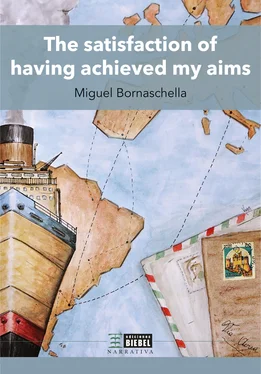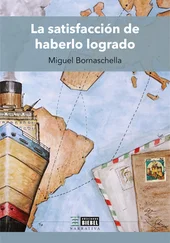The lives of all the members of my family and even the big house were saved from the devastation of the war. I must admit, that even living in a certain kind of poverty, our house stood up among the others in the town. My grand grandfather Giovanni Ricci came from a family that had been in better economic conditions than the others, thanks to some tricks of her mother… She had married a wealthy Ricci, father of my grand grandfather. By those days it was an ordinary thing to arrange marriages, no matter if there was love or not. People used the strangest reasoning to debate the convenience of their children’s marriage. Giovanni Ricci’s mother made use of some “appearance” in her dreams which recommended the union to that person who was, by chance, of an outstanding economic level. True or false, providential recommendation or practical reasoning, the case was that by the time being our families took advantage of that trick. Eventually those who formed that union were able to build a house that finally was outstanding in the town. The building of the house started in 1850 and was finished in 1855, as it was cut and remained forever in the stone of the arcade of the main entrance gate. That way the “palazzi isolati” –as these kinds of buildings were called– remained straight. It had a central yard called “cortillo” which was surrounded by several rooms and they were distributed, as it was usual by those days, to the different members of the family, which were at the same time occupied by their own ones. As it was logical and fair the properties passed from generation to generation, and as it was usual that none of the heirs could buy the corresponding part of others, it was then that the rooms were divided only among all those who had rights. The land was also divided this way, but if it was necessary, a surveyor was called. And if it still was necessary, justice definitely solved any disputes, thus it was the last word.
Every family had their own kitchen, which was also used to have lunch and dinner. It had a fireplace which worked with wood and was used both to cook and to heat the house, there was also an oven to cook bread and pizza. The whole family slept in one room. The tools used to work in the farm were in another room and there was a stable for the cow, the mule and the horse. There was only one of each one. The cow was used to give milk and the horse and the mule to draw the carriage and to cultivate the ground. There was also a place to keep the things produced in the farm (vegetables, fruit, meat) which were preserved in jars, bottles or vessels full of fat… People took and used only what was necessary to eat and sell - or exchange in case it were necessary. It was usual to see the fiddles where the olives were pressed with which oil was produced, or wine. There were no limits, it seemed, between one family and the others in the big house and everybody knew their secrets, their conversations, their joys and worries. Everybody could hear everybody’s conversations due to the proximity and also because they used to speak very loudly, and the roars resounded in the thick walls. But the comforts of the house were enough though. On one hand it was like this just because, and on the other hand because they did not know or have other possibilities. The electric energy was already supplied, but apart from the light at nights, there were no other gadgets to connect.
The whole house has remained well conserved until nowadays, outstanding almost at the top of the mountain. Seduced by its simple majesty I took the decision, some years ago, to buy it to the heirs and heiresses. I have had to deal with them all and though it was not an easy task, finally the aim was achieved once more. I bought it following the impulse of my heart, though I found later more acceptable excuses which convinced me that the quick decision had not been wrong. As far as you can see, the links between the past and the present is inevitable.
In 1945, the advance of the American army, determined the beginning of the end of the war. The people of the town left their shelters in the valley and went back to their houses encouraged by an atmosphere of safety that continued for some months by living together with the soldiers. They provided the people with tinned meat, chocolates, warm clothing and blankets. The women of the town, including my mother, washed their clothes in return as an expression of gratitude. This task went beyond an ordinary one since the soldiers’ clothes were infested with lice, fleas and other mites which emerged in great quantities when the clothes were soaked in hot water.
Despite the resignation that the consequences of the war had left in those people and the silent incorporation of the suffering into their everyday lives, the truth was that the economy had weakened and turned into such difficult stages that it was impossible to bear. The food rationing made my father go out and work in different fields cutting wheat just to be paid with a plate of food; even though, on some occasions, not even this was procured. Poverty was beginning to be felt, but people coped with it with dignity. It was then more usual to see neighbours wearing patches in their clothes. Once my parents said they had seen a man wearing a white shirt with a red patch, and he was proud of it. The crisis had affected his life in such an extreme that he had not even a piece of cloth with the same colour of the torn shirt, but having found a solution to his shirt made him feel proud of himself.
Then our family and others in the town, after having done the corresponding long and bureaucratic procedures and covered by the benefits given by the Marshall Plan promoted by the United States of America, received small monetary compensation to remedy the loss of olive trees, animals and any kind of damage made in the buildings. The amount covered just part of what had been lost, but it was well received and the people appreciated this assistance truthfully. But these were not the only usual disadvantages of the war. Others were solved with the contribution of the members of the clergy. With a lot of patience they interfered between neighbours when due to military incursions or bombing their personal possessions had been mixed. Useful and basic things such as blades or saucepans happened to turn up in a neighbour’s house, being this enough to start disturbance, and the clergy negotiated for settling such matters. These kinds of disputes pictured the characteristic of the town where deep and unresolved enmities became confrontations forever, generational and permanent. The causes for disputes could have been because of politics or because an animal had gone into a field and ruined the plantations, also because of love affairs, or unfulfilled promises. The sceneries for these confrontations were several and different, but in the collective memory in general and in mine in particular there has remained one: … One Sunday after mass, a woman with an advanced pregnancy stopped out of the church to face the responsible man, who was not fulfilling his obligations or keeping his promises. She stood in front of him and although she soon realized that was a useless conversation, she had never imagined that her reaction, the one she had planned during her many sleepless nights, would have been so well justified. The man rejected and insulted her, then tried to keep her apart with his arm to go on his own way. That was the last thing he did. The woman felt that her blood and hatred turned into foam. This marked her fate definitely. She took a knife out of her clothes which was as big as the coming tragedy and stabbed him with it. He just had enough time to suffer his own death. The woman had her baby in prison. He grew up and studied there. Then he became a good man, graduating in International Commerce. He lives in Paris nowadays and comes back to his town from time to time. I had the pleasure of meeting him.
Читать дальше












